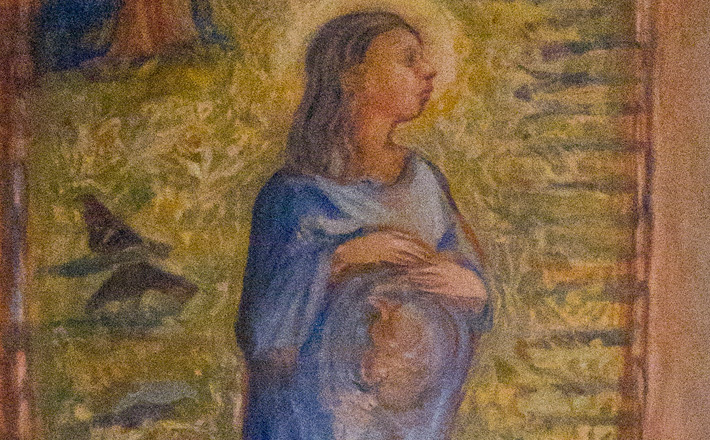Commentary on Romans 1:1-7
The opening of the letter to the Romans contains, in seven tightly packed verses, a summary of the themes that will be discussed in the rest of the letter.
It describes who Paul is and how he gets his authority. It presents the content of the gospel and its implications for Paul’s addressees, and it describes who these addressees are.
The first seven verses of the epistle are as good an introduction as any to some of the main elements of Paul’s thought. The Italian philosopher Giorgio Agamben even goes as far as to say that the first verse of the epistle contains the letter as a whole: “… each word of the incipit contracts within itself the complete text of the Letter, in a vertiginous recapitulation. … Understanding the incipit therefore entails an eventual understanding of the text as a whole.”1
The opening sentence in the Greek is twelve lines long and encloses all seven verses. It intertwines elements about Paul, Christ, and the Roman community. When Paul writes to the community in Rome, he addresses a community he has not founded, contrary to the other communities to which we know he sent letters. Because of this particularity, Paul needs to justify why he writes in order to prepare his visit and then ask for support for his mission. Thus, in the opening section of his letter, Paul is able to show how he and the Roman community are interconnected and therefore have some obligations to each other.
Paul begins his letter by giving some information about himself, and from the very beginning, he weaves his own life with the life of Christ. After indicating his name, Paulos, he immediately follows it with an apposition that defines his own identity much more precisely, slave of Christ Jesus. This designation indicates who Paul’s master is and thus, in whose authority he addresses the congregations in Rome.
In the Roman world, a slave was considered good if he or she reflected the will of his or her master and adapted his or her own will to the will of the master.2 Paul is not speaking out of his own mind, but, as a slave, reflects the will and authority of his master, Christ. In addition, the designation slave is precisely one of the identities that the members of the Roman churches are invited to adopt for themselves (Romans 6:22). Paul is modeling a self-understanding that he hopes his addressees will also accept.
Having established through the designation “slave” that he is doing the biding of a master, Paul then clarifies his purpose, which is here coined in terms recalling the vocation of prophets: he is called to be an apostle, set apart for the gospel or good news of God. The purpose or direction of his call is towards (eis) the gospel of God. In this brief section, Paul has conveyed that he is not his own master, that he is writing on behalf of Christ and is acting with a purpose, towards a goal which is the gospel of God. His name, Paulos, is eclipsed by his obedience to his master and by his purpose as an apostle.
His next move is to complicate his self-presentation by developing what he means by gospel of God. This is done in a long relative clause, which describes the good news as having been announced in the scriptures through the prophets and being about the son. The son is described as being of the seed of David, according to the flesh. He is then established as son of God as a result of his resurrection from the dead and identified as “Jesus Christ our Lord” (Romans 1:4). The language that Paul uses about Jesus is anchored in the Jewish tradition, and respects the Jewish notion that the messiah comes from Davidic descent, while also giving Jesus his “superhuman” dimension as son of God. The good news is thus about the Davidic son, made son of God through his resurrection.
However, Paul is not so much concerned with the events related to Jesus. These events (his life, death and resurrection) happened in the past, and what interests Paul is to show how they affect not only his own life (they set him apart as slave of Christ and as apostle) but also the life of the Roman community. The gospel about Christ makes Paul who he is, but it also calls into existence his addressees. They also are called to belong to Jesus Christ (umeis klêtoi Iêsou Christoû). Because of the good news of Jesus, both Paul and the members of the Roman house churches have received grace and apostleship. In the union with Christ, Paul is able to address the recipients of his letter, whom he does not know personally, in the first person plural. Christ unites them in the gift of grace and apostleship.
Finally, he reaches the end of his sentence with a more specific description of the community in Rome. Here he switches to the second person plural and addresses the Romans directly. He describes them first in relationship to their connection to Jesus Christ (klêtoi Iesou Christou), echoing both his calling as belonging to Christ and as apostle.
He adds that they are beloved of God and called saints. In these words, one detects some rhetorical exaggeration probably aimed at ensuring the benevolence of his addressees (captatio benevolentia); yet at the same time, the description corresponds to what the good news is for Paul. The identity of the Christ-believers is one that is defined by God’s love, something that Paul will present more fully in chapter eight, and this identity needs to be translated concretely in the behavior of saints, who are in the world but not of the world.
In an extremely dense paragraph, Paul has established the key identity of the Christ-believers: slaves of Christ. He has shown the connection of the good news about Jesus with the Jewish Scriptures and has put into place a relation of mutual obligation and respect with a community he does not know. They are all children of God, and Paul counts on this kinship to build a community that will receive him with hospitality and support him in his missionary efforts towards Spain.
1 Giorgio Agamben, The Time That Remains. A Commentary on the Letter to the Romans (trans. Patricia Dailey; Stanford: Stanford University Press, 2005), 6.
2 J. Albert Harrill, Slaves in the New Testament: Literary, Social and Moral Dimension (Minneapolis: Fortress Press, 2006), 21, 23 and 29.


December 22, 2013